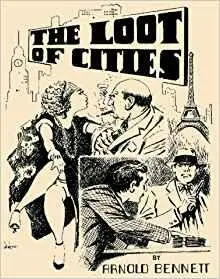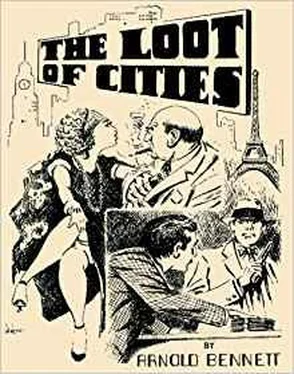The Fire of London by Arnold Bennett
Pensa, lettor, se quel che qui s'inizia non procedesse, come tu avresti di piu sapere angosciosa carizia.
DANTE.

"YOU'RE wanted on the telephone, sir."
Mr. Bruce Bowring, managing director of the Consolidated Mining and Investment Corporation, Limited (capital two millions, in one-pound shares, which stood at twenty-seven-and-six), turned and gazed querulously across the electric-lit spaces of his superb private office at the confidential clerk who addressed him. Mr. Bowring, in shirt-sleeves before a Florentine mirror, was brushing his hair with the solicitude of a mother who has failed to rear most of a large family.
"Who is it?" he asked, as if that demand for him were the last straw but one. "Nearly seven on Friday evening!" he added, martyrised.
"I think a friend, sir."
The middle-aged financier dropped his gold-mounted brush and, wading through the deep pile of the Oriental carpet, passed into the telephone-cabinet and shut the door.
"Hallo!" he accosted the transmitter, resolved not to be angry with it. "Hallo! Are you there? Yes, I'm Bowring. Who are you?"
"Nrrrr," the faint, unhuman voice of the receiver whispered in his ear. "Nrrrr. Cluck. I'm a friend."
"What name?"
"No name. I thought you might like to know that a determined robbery is going to be attempted to-night at your house in Lowndes Square, a robbery of cash — and before nine o'clock. Nrrrr. I thought you might like to know."
"Ah!" said Mr. Bowring to the transmitter.
The feeble exclamation was all he could achieve at first. In the confined, hot silence of the telephone-cabinet this message, coming to him mysteriously out of the vast unknown of London, struck him with a sudden sick fear that perhaps his wondrously organised scheme might yet miscarry, even at the final moment. Why that night of all nights? And why before nine o'clock? Could it be that the secret was out, then?
"Any further interesting details?" he inquired, bracing himself to an assumption of imperturbable and gay coolness.
But there was no answer. And when after some difficulty he got the exchange-girl to disclose the number which had rung him up, he found that his interlocutor had been using a public call-office in Oxford Street. He returned to his room, donned his frock-coat, took a large envelope from a locked drawer and put it in his pocket, and sat down to think a little.
At that time Mr. Bruce Bowring was one of the most famous conjurers in the City. He had begun, ten years earlier, with nothing but a silk hat; and out of that empty hat had been produced, first the Hoop-La Limited, a South African gold-mine of numerous stamps and frequent dividends, then the Hoop-La No. 2 Limited, a mine with as many reincarnations as Buddha, and then a dazzling succession of mines and combination of mines. The more the hat emptied itself, the more it was full; and the emerging objects (which now included the house in Lowndes Square and a perfect dream of a place in Hampshire) grew constantly larger, and the conjurer more impressive and persuasive, and the audience more enthusiastic in its applause. At last, with a unique flourish, and a new turning-up of sleeves to prove that there was no deception, had come out of the hat the C.M.I.C., a sort of incredibly enormous Union Jack, which enwrapped all the other objects in its splendid folds. The shares of the C.M.I.C. were affectionately known in the Kaffir circus as "Solids"; they yielded handsome though irregular dividends, earned chiefly by flotation and speculation; the circus believed in them. And in view of the annual meeting of shareholders to be held on the following Tuesday afternoon (the conjurer in the chair and his hat on the table), the market price, after a period of depression, had stiffened.
Mr. Bowring's meditations were soon interrupted by a telegram. He opened it and read: "Cook drunk again. Will dine with you Devonshire, seven-thirty. Impossible here. Have arranged about luggage. — Marie." Marie was Mr. Bowring's wife. He told himself that he felt greatly relieved by that telegram; he clutched at it; and his spirits seemed to rise. At any rate, since he would not now go near Lowndes Square, he could certainly laugh at the threatened robbery. He thought what a wonderful thing Providence was, after all.
"Just look at that," he said to his clerk, showing the telegram with a humorous affectation of dismay.
"Tut, tut," said the clerk, discreetly sympathetic towards his employer thug victimised by debauched cooks. "I suppose you're going down to Hampshire to-night as usual, sir?"
Mr. Bowring replied that he was, and that everything appeared to be in order for the meeting, and that he should be back on Monday afternoon or at the latest very early on Tuesday.
Then, with a few parting instructions, and with that eagle glance round his own room and into circumjacent rooms which a truly efficient head of affairs never omits on leaving business for the week-end, Mr. Bowring sedately, yet magnificently, departed from the noble registered offices of the C.M.I.C.
"Why didn't Marie telephone instead of wiring?" he mused, as his pair of greys whirled him and his coachman and his footman off to the Devonshire.
II. The Devonshire Mansion, a bright edifice of eleven storeys in the Foster and Dicksee style, constructional ironwork by Homan, lifts by Waygood, decorations by Waring, and terra-cotta by the rood, is situate on the edge of Hyde Park. It is a composite building. Its foundations are firmly fixed in the Tube railway; above that comes the wine cellarage, then the vast laundry, and then (a row of windows scarcely level with the street) a sporting club, a billiard-room, a grill-room, and a cigarette-merchant whose name ends in "opoulos." On the first floor is the renowned Devonshire Mansion Restaurant. Always, in London, there is just one restaurant where, if you are an entirely correct person, "you can get a decent meal." The place changes from season to season, but there is never more than one of it at a time. That season it happened to be the Devonshire. (The chef of the Devonshire had invented tripe suppers, tripes à la mode de Caen, and these suppers — seven-and-six — had been the rage.) Consequently all entirely correct people fed as a matter of course at the Devonshire, since there was no other place fit to go to. The vogue of the restaurant favourably affected the vogue of the nine floors of furnished suites above the restaurant; they were always full; and the heavenward attics, where the servants took off their smart liveries and became human, held much wealth. The vogue of the restaurant also exercised a beneficial influence over the status of the Kitcat Club, which was a cock-and-hen club of the latest pattern and had its "house" on the third floor.
It was a little after half-past seven when Mr. Bruce Bowring haughtily ascended the grand staircase of this resort of opulence, and paused for an instant near the immense fireplace at the summit (September was inclement, and a fire burned nicely) to inquire from the head-waiter whether Mrs. Bowring had secured a table. But Marie had not arrived — Marie, who was never late! Uneasy and chagrined, he proceeded, under the escort of the head-waiter, to the glittering Salle Louis Quatorze and selected, because of his morning attire, a table half-hidden behind an onyx pillar. The great room was moderately full of fair women and possessive men, despite the month. Immediately afterwards a youngish couple (the man handsomer and better dressed than the woman) took the table on the other side of the pillar. Mr. Bowring waited five minutes, then he ordered Sole Mornay and a bottle of Romanee-Conti, and then he waited another five minutes. He went somewhat in fear of his wife, and did not care to begin without her.
Читать дальше













